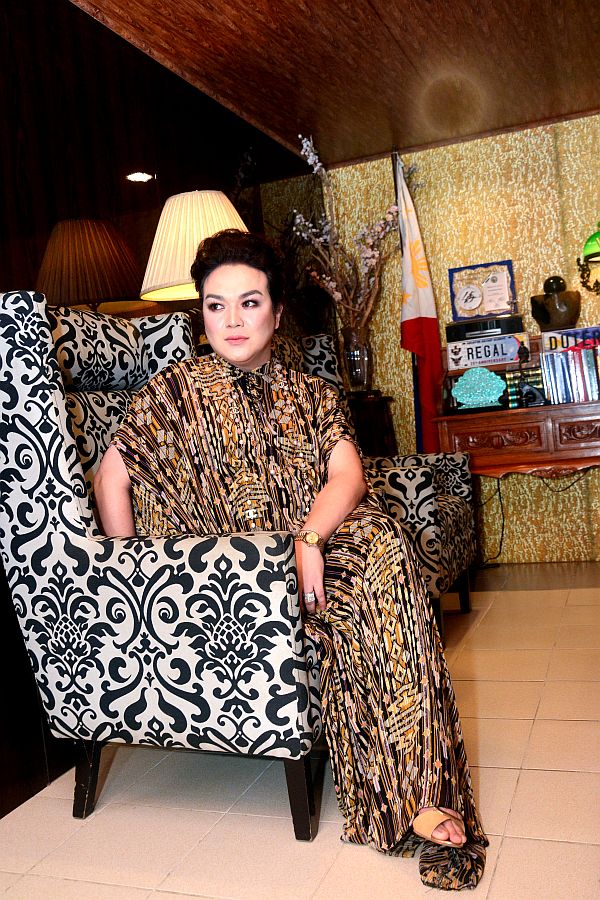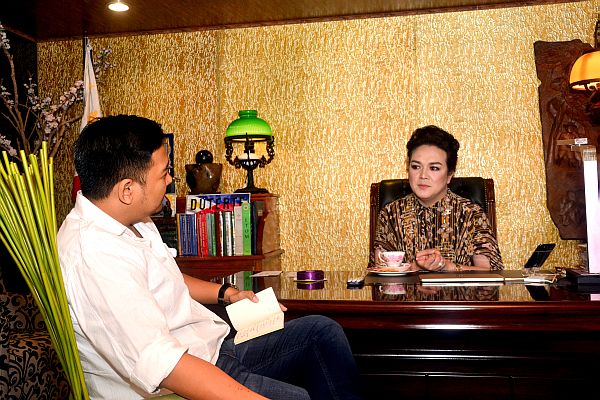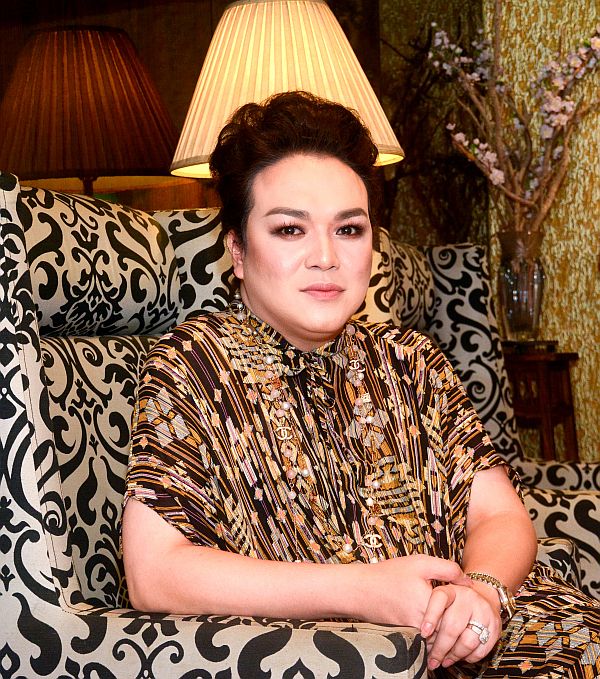
Regal Oliva (Photo by Jed Yu)
Almost like a cocktail setup at 9:20 a.m. opposite the transaction windows at the foyer—and instead of some chipped wooden benches—white Tiffany chairs are lined up against the cascades of crisp white see-through drapes that filter the sunlight streaming from the glass wall panels at the ground level of Mandaue City Hall.
The floor tiles, squares from the old American architectural influence.
A manicured landscape of polished rocks, a botanical family of palms in planters, and two China porcelain jars have been arrayed beside the threshold.
“Bati kaayo ang City Hall, uy,” Regal Oliva, lawyer, 40, sits behind the desk in the innermost part of the room, walking past four clerk staff in the receiving area.
He rolls his eyes in humor on authoring the redecoration of his office at the ground floor, including its vicinity, since his installation as the treasurer of the government of Mandaue City in 2011. Last Nov. 21, in Bacolod, he took oath as the newest Career Executive Service Eligible, saying: “I’m happy to be the only one from my region representing the LGUs (local government units). The wait was long but fulfilling. This is for you, Mom.”
Anyone who has been to his house—then into his bedroom—could certainly identify the badge of a true design connoisseur. “I could have been in the arts, or I could have been a fashion designer,” he beams.
The facelift of the interior of the building becomes the outward manifestation of the heartbreaks now out in the open.
From organizing an assembly of advocates in college (“Bakla Ng Silliman Lumalaban”) to fortifying a first-of-its-kind ordinance that toppled discrimination based on sexual persuasion, he feels embattled now more than ever.
“It’s difficult. That’s New York pa, ha. It’s a pot of freedom and democracy and equality, and we’re treated like that,” he relates an incident in
a bathroom during a recent trip there.
As the identity spectrum splices into more unstudied dimensions, could identifying them in rigid terms address the most pressing issue?
Ergo, from here to eternity, New York must learn from Mandaue City’s triumph.
Dressed in billowy kaftans daily to work, however, has multiplied the pain even more. The million dollar coiffure, of course: His signature bouffant hair he religiously styles himself with.
In the beginning, we were already sold to some of the things everyone knew about him. Regal is a theatrical creature, a die-hard Broadway fanatic. So what’s the one Broadway role he could have done better than any star?
He is an iconoclast who thrives with gobs of platforms: a television host (“Partners-in-Law,” Wednesdays at 10 p.m., CCTN 47), a radio anchor (“Ikaw Og Ang Balaud,” Sundays at 4 p.m., GMA-DYSS).
Then, a little irreverence. Mythologized, demonized, celebrated: Every shade conveys an inscrutable allure.
Most especially when he’s in love. Ooh, la la.
Is having a love life important to you?
Of course, it should be there. Love, relationship, love life should always be there.
Aren’t you too busy for love?
I have to make time. That’s the only thread that can link the missing mark.
What is love to you?
I remain to be speechless (laughs). I can answer a lot of questions, but when it comes to romantic love, mura’g I am a different person.
So mura’g ma wagtang ko diha.
Are romantic relationships with LGBTQI (lesbians, gays, bisexuals, transgender, queer, intersex) different?
Love is the same. Love is love is love is love. There are no differences with straight couples.
It’s just that there are stereotypes being amassed more on LGBT couples, especially if you are a transgender.
If you are a gay person in our country, kinahanglan gyud kuno nga ikay mugasto, pangwartahan ka, that’s the stereotype that we have.
You know in a true relationship of gay couples, if you know them, it’s not like that. It’s truly love.
Even with the straight couples, kung kinsay to ang mas daghang kwarta, mao mugasto.
And why is it not a taboo for a woman to spend for a man? It’s not even taboo in our country. Nganong dili man taboo for a man to be “under the saya”?
Kung kinsay to ang naa, he or she spends for it.

(Photo by Jed Yu)
You were a prominent contributor in drafting the LGBTQI Code. What does it comprise?
It became a very prominent ordinance because of the fact that it might have been the only city ordinance in the Philippines to really tackle on the LGBTQI gender expression.
In other words, it did not only touch on anti-discrimination, but it also respected the gender expression of an individual.
If you are a transgender woman, you respect the transgender woman as a woman.
You cannot be discriminated upon from employment if you dress up as a woman—if that is how you identify yourself, then you are respected here in Mandaue.
Then it became unique.
It’s the only city in Asia to have done that yet.
It became so unique, murag model ordinance na siya for all LGBTQIin local government.
In fact, Quezon City followed suit.
Q
uezon City had its anti-discrimination ordinance, but they improved it after Mandaue City.
I am happy that we positioned ourselves to be first in it. We’ve been emulated by a lot of LGUs. We’re now in the process of doing, implementing the rules and regulations.
Now we’re working on gender-free restrooms. We might have to start with the government and new buildings… daku-daku gyud ang gasto for establishments.
Take us through the “bathroom incident” that you felt discriminated in New York.
It happened last year.
I was in New York. I came from Boston, a three-hour train ride.
Kaihion na gyud kay ko. I’m a bit uncomfortable using the restrooms at train stations kay hugaw kaayo.
So naghuwat ra ko sa akong friend to pick me up at the train station, and after that, we went to this Greek restaurant.
I had to go to the restroom to answer the call of nature.
Derecho ko sa gents’ room, and lo and behold this Caucasian man nga dako gyud kaayo, giant gyud siya for me, said: “You’re not supposed to be here.
Why are you here?
You are supposed to be in the ladies’ room.”
For them I looked like a lady.
Wala bya ko’y make-up ato, nothing.
I had to go to the ladies room to form a line.
Taas kaayo ang linya, mao man gyud na ang problema sa ladies room.
Oh, my goodness —nagsige gyud ko’g duko. I was a little uncomfortable because people were looking at me.
Murag nag duda sila ug unsa ba gyud ko. As soon as I reached the cubicle, pag gawas sa babae —a Caucasian again—pagawas niya, ni tanaw siya nako with an inquisitive look.
Gi-pa gamay nako akong tingog (a falsetto) and said, “Excuse me.”
Naka sulod gyud ko. It’s difficult. That’s New York, pa ha.
It’s a pot of freedom and democracy and equality, and we’re treated like that.
I wasn’t surprised when I was treated like that in Arizona because Midwest is a bit conservative.
What kind of pain did you go through that ushered you to the heart of your advocacy?
Three incidents. The first incident was when one of my closest friends lived in the dormitory and was about to be thrown from the third floor because he will not perform a sexual act to one of his mates.
It was in Silliman. He was a nursing student. He was one of my first few friends in Silliman.
I fought for him on that note. I did not know about equality. He was harassed.
I did not even know the concept of rape and that it could happen to men.
The second one was with my best friend Pines, when he was also raped by five men in the dormitory.
That really enraged me. The third, I was walking along the corridor, somebody approached me and grabbed my breast—iya gyung gi kumot ug kusog kaayo.
Oh, God, that changed the whole thing.
What was the first step?
After that, my advocacy in Silliman was so apparent already.
I went against the tides. Silliman University is a Christian institution.
Way back then in 1997, it was taboo to talk about LGBTQI 20 years ago.
So the fight for gay rights was fresh then. I started that because of the various harassments that have been experienced by a lot of my co-LGBT members.
I ran for student government president. I lost because of the fact that I am gay.
That didn’t give me the excuse, ba?
Di siya pwede. Just because of my gender, I will be discriminated upon. I only lost with two votes. I made a certain organization—Bakla Ng Silliman Lumalaban—that was the beginning of everything.
Breaking through norms should be the most tedious part of the movement. Tell us more.
Now, it’s easier for gays to break through. This generation would take gays thrice the effort compared to a straight individual to break through to society.
Take me back 20 years ago, it would take you 10 times the effort to really show them that you are deserving of a certain position, that you’re deserving of a certain organization, that you have to be identified to be treated equally… 10 times the effort to fight for your rights, nga buotan ka, nga you’re honest.
Previously asi, kung bayot ka, kawatan ka, rapist, you cannot be trusted with money, you cannot be trusted with children so these are things that you have to break through.
How far have we gone?
Not very far yet. In a society where it is dictated by dogmas of Catholicism, by Christian pronouncements, the righteousness of people—not very far yet.
I am happy that the anti-discrimination bill in Congress has already been passed. I hope the Senate will immediately hear it. So far in our country, tolerance is here.
Tolerance among LGBTQI is apparent, pero acceptance is not yet there.
Tolerence man gud pasagdan ra mi to co-exist. Pero acceptance man gud happens when there are laws, legislations protecting the rights of individuals.
Gay marriage?
Yes, of course. Gay marriage, gay union, whatever you call it.
It is a right that has to be upheld by two individuals who are in love.
That is also a protection to them for their properties.
As of now, gay partnership is not protected by law. In other words, insurance, taxation, adoption of children, wala gyud na.
It’s not protected by Philippine laws. I’m not saying I will be in a gay union.
It’s just that there are gay couples in our country who need protection from laws. And why are they not protected?
Is our country heading to that direction?
I think we are. I hope that the speaker of the house can manage and get more votes for this bill.
I mean it’s the speaker of the house who is sponsoring the bill for gay union.
And one of our Congress representatives here in Cebu, Gwen Garcia, co-authored it. So I’m happy.
It’s 2017. Why aren’t we doing anything yet? Everything has to evolve. I am very hopeful that it can see the light of day in my lifetime.
What’s the most challenging part of being the city treasurer?
In 2010, when I had a fight with (former) Gov. Gwen Garcia, I collected taxes from CICC (Cebu International Convention Center), and then she said:
“He or she must study and do her homework. He or she must not collect taxes from a government institution.” She never addressed me as a he or as a she. In other words, my pronoun was a bit hanging for her. It was an insult, at the same time, a witty answer from her. But I told her: “You can call me he. You can call me she. You can call me it. Just pay your taxes.”
Your gender identity seems to be attached to your profession.
The hard thing about being a city treasurer, at the same time being an LGBTQI member, mura siya’g ni double.
The challenge to be respected in society, collect taxes is a bit hard. Kay sa stereotype, kung bayot ka lagi, di ka masaligan ug kwarta kay imong igasto sa imong lalaki. It’s the box that I’m in.

(Photo by Jed Yu)
Do you still experience terrible discrimination now, the way you were mistreated in college?
I can’t say that I still experience it. But I don’t know how society is looking at me now, especially that I am in a bubble like this.
Sometimes, I only hear what is good about me.
It’s hard to gather what they are talking against me.
I am not saying everyone who is like me should dress like me.
I spend a lot of time in the morning for hair and make-up. B
ut that’s just me. We have different attacks, and we have different callings.
What do you think is the most effective financial management in an industrialized city like Mandaue?
Do not be afraid to spend and to collect.
The most effective is to exert all efforts to collect and spend it wisely on public service.
Honest to goodness, high integrity of financial management and physical management of city takes hold not only for the city treasurer but also for all stakeholders. I cannot be alone in doing this. It must be with the commitment of the mayor, accounting, everybody involved.
You have a flaming devotion to Broadway. How many shows have you seen in Broadway, New York?
Oh, my goodness! I lost count. “Sunset Boulevard” is my most favorite. I cried like crazy.
What Broadway role you think you could have reprised better than the actor?
Norma Desmond (“Sunset Boulevard”). She’s so me.
Favorite singer?
Barbara Streisand.
Would you have been a theater performer?
Oh, yes. If I were not led to government service, I would be on stage.
I would have been a fashiondesigner. I would be into the arts.
I am happy that my younger siblings are pushing my drive.
I could have been there, too.

